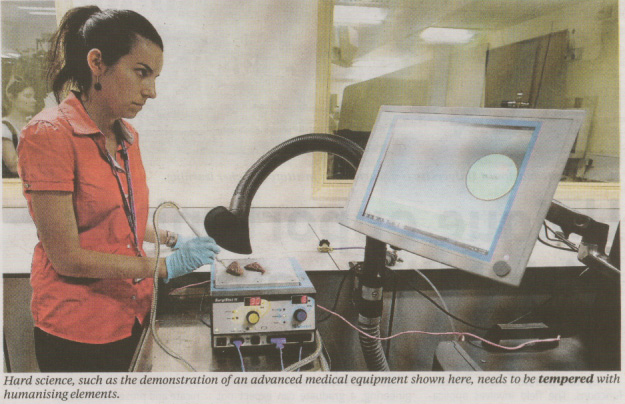Humanising Science
Professor Tan Sri Dato' Dzulkifli Abdul Razak
Learning Curve: Perspective
New Sunday Times - 21-07-2013
IT is good news that the Education Ministry has come up with strategies to achieve the student ratio of 60:40 in favour of the Science stream.
This will be a big jump from the current ratio of 20:80 which is described as worrying when trying to fill the gaps in the industry.
The Ministry of Science, Technology and Innovation’s report titled 2020 Human Capital Road Map identified reasons for a decline in interest in Science among students.
Each time we talk about the development of Science with respect to Vision 2020, Challenge 6 is uppermost in our mind: "The establishment of a scientific and progressive society, a society that is innovative and forward-looking, one that is not only a consumer of technology but also a contributor to the scientific and technological civilisation of the future."

The multiple dimensions are all too often forgotten and not given deeper thought.
Some of these aspects are lost in translation, and Science is presented only from a utilitarian or consumerist viewpoint.
It is imperative that we contrast the need to be a "consumer of technology" from that of a "contributor to scientific and technological civilisation of the future".
The former is rather easy and, in fact, Malaysia is doing well. The various programmes launched with technology thrown in as freebies are just one indication. The much-ado-about-nothing hype created by the social media is perhaps another sign!
However, when it comes to the latter — contributor to scientific and technological civilisation, and of the future - the mind boggles.
This goes back to the fundamentals of "Science", including the philosophy and history of Science and Technology.
Furthermore, it involves understanding the very foundation of scientific and technological civilisation, going back to the days before the Renaissance as well as the Scientific and Industrial Revolutions.
Most scientists today may look blank when they are asked how these events feature in their understanding of Science and Technology. When queried further on what "Science" constitutes, there will be even more blank expressions! Why?
The simple answer is that they are never taught about the events as these are not regarded as part of "hard" Science as such.
The topics are relegated to the Social Sciences, which are irrelevant to the scientist, who has been "reduced" to just "human capital" that fulfils the function of producing scientific products for wealth creation.
This follows the same "reductionist" approach that compartmentalise Science into smaller and smaller bits.
While this is good to a certain extent, it does not augur well for attempts to solve problems faced by "human beings", threatening their very civilisation as Science and Technology progress in leaps and bounds.
Take global warming, for example. Left unchecked, global warming can cause the collapse of the current society before the next century. Yet Science seems helpless as a single discipline to halt this catastrophe. In fact, there are allegations that scientists are equally responsible for the problem.
When elaborating, "What is education for?" Paul Sears Distinguished Professor of Environmental Studies and Politics at Oberlin College, David Orr, said: "The truth is that many things on which your future health and prosperity depend are in dire jeopardy... It is worth noting that this is not the work of ignorant people.
"It is, rather, largely the result of work by people with BAs, BSs, LLBs, MBAs and PhDs." These are among the "human capital" educated in Science and Technology that have become part of the prevailing problem, rather than the solution.
In other words, Malaysia's growth cannot be accelerated to achieve the 2020 goal with mere scientific and technological talent — it may not be the "fully developed country" as envisaged if the talents are not properly constituted.
Wawasan 2020 is not just about economic development but also creating a civilised society that takes Science and Technology beyond their utility function, towards its humanising role.
Indeed, there is now the emerging discipline Sustainability Science that addresses the larger question of how humanity as a whole can benefit from scientific and technological advances.
And these must be incorporated into the Science curriculum at all levels as deemed by Challenge 6!
- The writer is the vice-chancellor of the Albukhary International University
